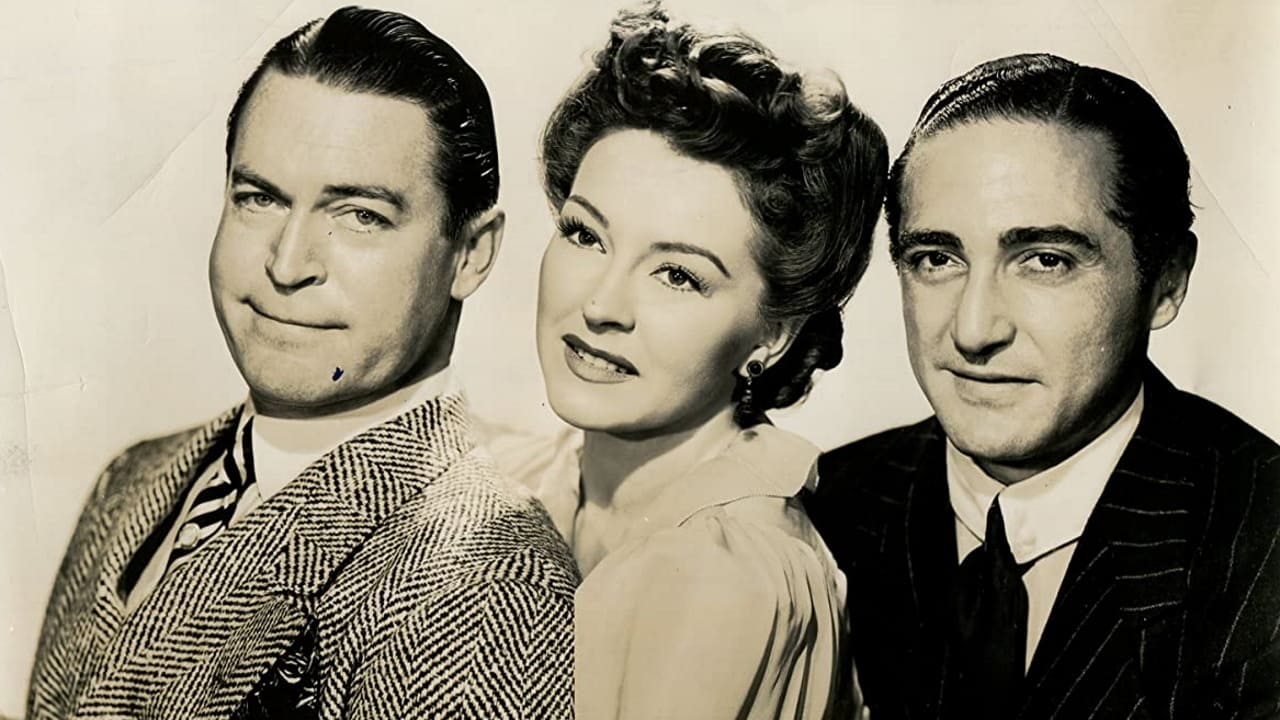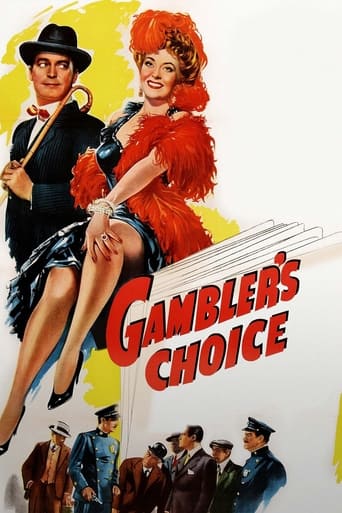Interesteg
What makes it different from others?
GurlyIamBeach
Instant Favorite.
Teringer
An Exercise In Nonsense
Quiet Muffin
This movie tries so hard to be funny, yet it falls flat every time. Just another example of recycled ideas repackaged with women in an attempt to appeal to a certain audience.
bkoganbing
Apparently there is a division of opinion among the critics. Some have said this was B picture ripoff of Manhattan Melodrama, others opt for Angels With Dirty Faces. If I had to choose I would choose the latter because I could see any number of other Warner Brothers features here that would have starred James Cagney and Pat O'Brien.Gamblers Choice was made by the Pine-Thomas producing team who did a lot of B films over at Paramount and early in their careers, their stars were a pair of guys who were big in the early sound era, but had slipped in status by the Forties, Richard Arlen and/or Chester Morris.Morris stars here as the ruthless gambler type who grew up in those years entitled the Gay Nineties. Without as much flash as James Cagney gave his parts, Morris gives a pretty good account of himself as the bad boy who is loyal in the end to his friends.Those friends being singer Nancy Kelly and policeman Russell Hayden who is the upright and honest cop that Pat O'Brien was always playing. Hayden's own sense of loyalties to his friends almost trips him up and Kelly has to choose between Morris and Hayden.The production values were not MGM gloss, but you did get a nice sense of New York in the Roosevelt-Taft era before World War I. Sheldon Leonard as Morris's rival gambling palace owner and Lee Patrick the bookmaker's widow who Morris romances and then throws over for Kelly standout themselves in their roles.Nothing terribly special, but no one need be ashamed of their work here. Gamblers Choice holds up very nicely for today.
Michael_Elliott
Gambler's Choice (1944) ** (out of 4) Low-budget rip of MGM's MANHATTAN MELODRAMA has pretty much the same story (which itself was ripped countless times before this movie). In the film three childhood friends get caught stealing some money with two being released to their parents but the third being sent to a reform school. As adults, the bad gambler (Chester Morris) meets up with his friends with one being a cop (Russell Hayden) and of course they're both in love with the good girl (Nancy Kelly). If you're familiar with the crime pictures of the 1930s then it's pretty certain you've seen MANHATTAN MELODRAMA or if not you've probably seen the classic ANGELS WITH DIRTY FACES, which followed the same storyline in a way. The entire plot of friends going on opposite sides of the law wasn't original in the 30s but by the 40s it was even more played out and tiresome. I must admit that I was pretty much bored out of my mind at the five-minute mark when the kids were finishing up. When the adult actors came on screen things never really picked up and that's a real shame because they could have done so much with this film. Morris, one of my favorites, is wasted and pretty much sleepwalks through the film. That typical charm and energy the actor brings to most roles was missing here and his chemistry with Davis and Hayden wasn't too strong. Hayden was pretty good in his role but the screenplay offers him very little. Supporting players Lyle Talbot, Lee Patrick and Lloyd Corrigan are pretty much wasted in their small roles as well. What I never understood about rips is why their producers, screenwriters, directors or at least stars never spoke up to try and change at least a little something. I mean, would it have been too much to ask for at least one little pinch of the story to be altered? I understand going down the same road but why not at least change it up a bit to where your viewer won't be bored because they've seen it all before? Granted, some rips are at least nice entertaining but sadly that's not the case with this thing and its 66-minutes go by at a very slow pace.
MARIO GAUCI
This Chester Morris vehicle is superior to AERIAL GUNNER (1943) – it's made by practically the same people – but still emerges as nothing special. The film follows the familiar plot line of MANHATTAN MELODRAMA (1934) – two childhood friends grow up to be on opposing sides of the law, one a cop (Russell Hayden) and the other a gambler (Morris); of course, they both happen to love the same girl (Nancy Kelly, whom I should be watching soon in her most important – and Oscar-nominated – role in THE BAD SEED [1956]) and, by the end of it, Morris has seen the error of his ways and gives his life – and gal – for his best pal.Actually, the early 20th century New York atmosphere is vividly recreated on a shoestring – and Morris struts in clear imitation of James Cagney (who starred in the similar ANGELS WITH DIRTY FACES [1938]); his character's epitaph, then, is borrowed from another Cagney vehicle – THE ROARING TWENTIES (1939). Featured in the colorful supporting cast are Sheldon Leonard (as Morris' business rival), Tom Dugan (as Morris' right-hand man), Lee Patrick (as Morris' financier), Lloyd Corrigan (as Kelly's politician father) and, in minor roles, Jimmy Conlin, Lyle Talbot and Dewey Robinson. Interestingly enough, the script was a combination of the writing talents of James Edward Grant, Irving Reis and Maxwell Shane (who also had a similar credit on AERIAL GUNNER).
boblipton
Pine and Thomas were known around Paramount as 'The Dollar Bills' because they were both named William and they could turn out a watchable second feature that would turn a nice profit on the cheap. For a decade or so they prospered, giving B talent a chance to shine in decently-written movies with good production values.Here Chester Morris, Nancy Kelly and Lyle Talbot -- a decade past their primes -- are enjoyable in the sort of movie that W.S. Van Dyke used to direct people in a decade earlier -- MANHATTAN MELODRAMA and SAN FRANCISCO, where the two male leads grew up together, one became a gambler -- usually played by Clark Gable -- and the other became a priest or a lawyer -- that could be Spencer Tracy or William Powell -- and they both love the same girl, of course. And that's the beginning, middle and end, with, of course, an interesting run of good character actors, of which Hollywood had a plethora in the 1940s. So don't expect anything startlingly original, but do expect a pleasant ninety minutes.

